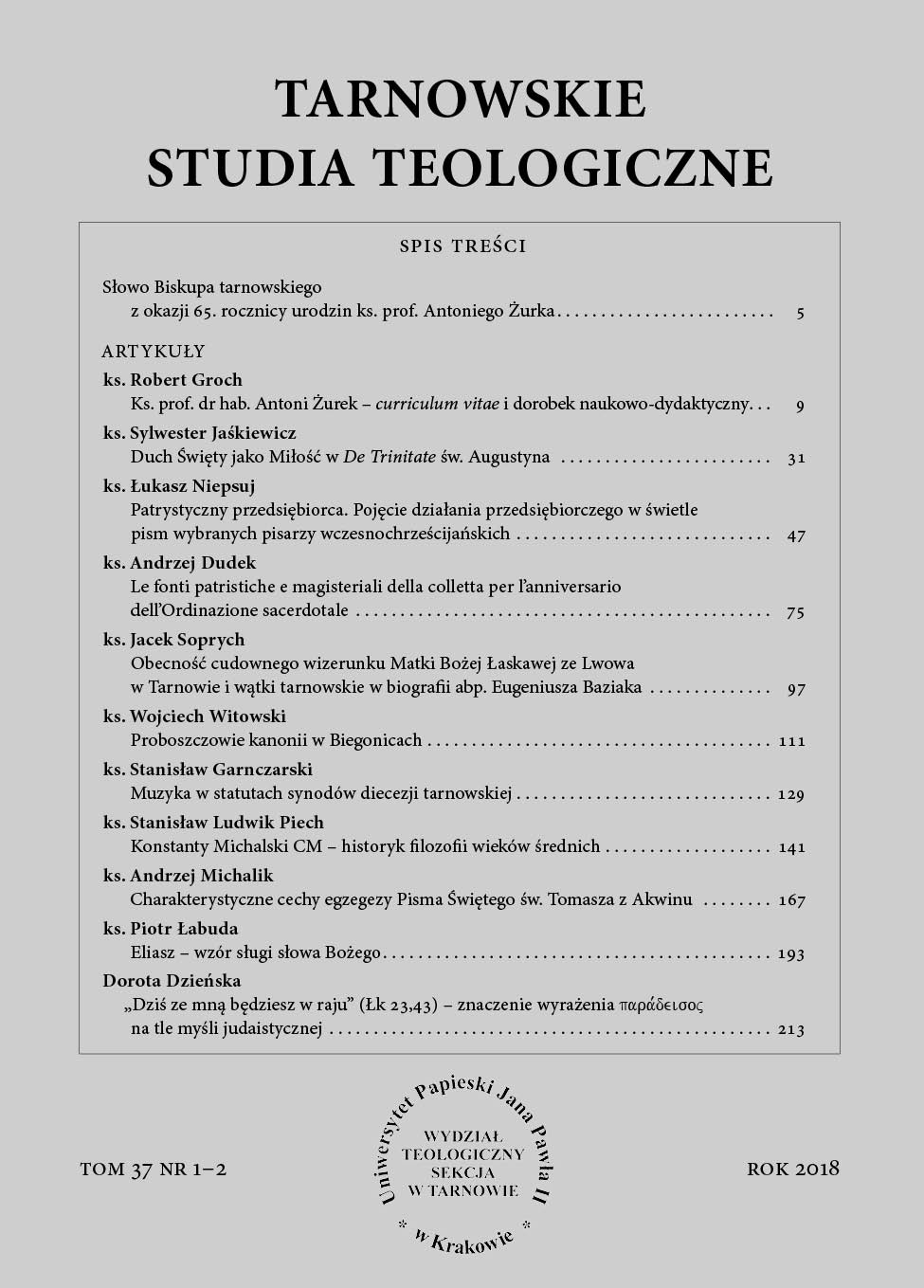Eliasz – wzór sługi słowa Bożego
DOI:
https://doi.org/10.15633/tst.3258Słowa kluczowe:
prorok Eliasz, słowo Boże, głoszenie, wierność, wiaraAbstrakt
Prorok Eliasz jest niewątpliwie szczególną postacią tak dla Starego Testamentu, jak i dla uczniów Chrystusa. Jego dzieje niewątpliwie mogą, co więcej, powinny stać się wzorem dla głosicieli słowa Bożego. Przymioty Eliasza – nade wszystko jest wiara i wierność słowu Bożemu – sprawiały, że jego misja miała moc. Sprawiały, że Eliasz wiernie trwał jako prawdziwy prorok Jedynego Boga Jahwe. Poznawanie i medytowanie jego dziejów z pewnością jest pomocne dla współczesnych proroków Jedynego Boga.
Bibliografia
Augustinovic A., De Eliae prophetae patria, „Antonianum” 30 (1950), s. 475–492.
Beck M., Elia und die Monolatrie. Ein Beitrag zur religionsgeschichtlichen Rückfrage nach dem vorschriftprophetischen Jahwe-Glauben, Berlin–New York 1999.
Benedykt XVI, List jego Świątobliwości Benedykta XVI na rozpoczęcie roku kapłańskiego z okazji 150. Rocznicy «dies natalis» świętego proboszcza z Ars, „L’Osservatore Romano” 315 (2009) z. 7–8, s. 3.
Bohlen R., Der Fall Nabot. Form, Hintergrund und Werdegang einer alttestamentlichen Erzählung (1 Kön 21), Trier 1978.
Bottini G. C., Una aggadah giudaica su Elia ripresa dai Padri, „Liber Annuus” 30 (1980), s. 174.
Bright J., Historia Izraela, Warszawa 1994.
Brodie T. L., The Birthing of the New Testament, Sheffield 2004.
Brown F., Litt D., The Brown-Driver-Briggs Hebrew and English Lexicon, Boston 20016.
Carroll R. P., The Elijah-Elisha Sagas: Some Remarks on Prophetic Succession In Ancient Israel, „Vetus Testamentum” 19 (1969), s. 400–415.
Chrostowski W., Bohaterowie wiary Starego Testamentu, Warszawa 1992.
Cogan M., I Kings. A new translation with introduction and commentary, New York 2001.
DeVries S. J., Prophet Against Prophet. The Role of the Micaiah Narrative (1 Kings 22) in the Development of Early Prophetic Tradition, Grand Rapids 1978.
DeVries S. J., 1 Kings, Dallas 1985.
Dziadosz D., Eliasz – starotestamentalny typ obrońcy wiary w jedynego Boga Jahwe i Jego Prawa, „Collectanea Theologica” 74 (2004) z. 1, s. 5–6.
Eissfeldt O., Die Bücher der Könige, w: E. Kautzsch, Die Heilige Schrift des Alten Testament, t. 1, Tübingen 1922, s. 532.
Flawiusz J., Dawne dzieje Izraela, Poznań 1979.
Fohrer G., Elia, Zürich 19682.
Glueck N., The River Jordan, Philadelphia 1946.
Guigui A., Le prophète Élie dans la liturgie juive, w: Élie le Prophète: Bible, tradition, iconographie, Leuven 1988, s. 115–135.
Hergesel T., Eliasz i Elizeusz, „Mężowie Boży” w służbie jahwizmu, „Studia Theologica Varsoviensia” 20 (1982) z. 2, s. 26.
Junker H., Der Graben um den Altar des Elias, „Theologische Zeitschrift?” 6 (1960), s. 298n.
Katz P., Jesus als Vorläufer des Christus. Mögliche Hinweise in den Evangelien auf Elia als den „Typos“ Jesu, „Theologische Zeitschrift?“ 52 (1996), s. 225.
Keller C. A., Wer war Elia?, „Theologische Zeitschrift?”16 (1960), s. 298n.
Łabuda P., Eliasz w chrystologii Łukasza, Tarnów 2012.
Łach J., Elizeusz jako sługa Eliasza i prorok Jahwe, „Ruch Bibilijny i Liturgiczny” 40 (1987) z. 4, s. 273–280.
Lohfink N., Biancio dopo la catastrofe. L’opera stolica deuteronomistica, w: Parola e messaggio, a cura di J. Schreiner, Bari 1970.
Montgomery J. A., Gehman H. S., The Book of Kings, Edinburgh 1951.
Noth M., Überlieferungsgeschichtliche Studien. Die Sammelnden und Bearbeitenden Geschichtswerke im Alten Testament, Tübingen 19673.
Oeming M., Naboth, der Jesreeliter. Untersuchungen zu den theologischen Motiven der Überlieferungsgeschichte von 1 Reg 21, „Zeitschrift für die alttestamentliche Wissenschaft” 98 (1986), s. 365.
Öhler M., Elia im Neuen Testament. Untersuchungen zur Bedeutung des alttestamentlichen Propheten im frühen Christentum, Berlin–New York 1997.
Paciorek A., Ewangelia według św. Mateusza. Wstęp – przekład z oryginału – komentarz. Rozdziały 14–28, t. I/2, Częstochowa 2008.
Rumianek R., Eliasz jako gorliwy prorok Boga zazdrosnego, w: Mów, Panie, bo słucha sługa Twój. Księga pamiątkowa dla Księdza Profesora Ryszarda Rubinkiewicza SDB w 60. rocznicę urodzin, red. W. Chrostowski, Warszawa 1999, s. 188.
Soggin J. A., Introduzione all’Antico Testamento. Dalle origini alla chiusura del Canone alessandrino, Paideia 19874.
Steinmann J., In Élie le prophète, t. 1, Bruges 1956.
Strack H. L., Billerbeck P., Kommentar zum Neuen Testament aus Talmud und Midrasch, Bd. 4, München 1928.
The Interpreter’s Bible, vol. 3, eds. G. A. Buttrick, B. W. Russell, New York 1954.
Vaux R. de, Le cycle d’Elie dans les Livres des Rois, Paris 1956.
Zieliński J., Historia wspólnoty pustelników z Wadi Es Siah. Nowa rekonstrukcja w świetle badań archeologicznych na Górze Karmel, Kraków 2002.
Pobrania
Opublikowane
Numer
Dział
Licencja
Autorzy publikujący w czasopiśmie udzielają jego wydawcy zgody o następującej treści:
- Autor zachowuje autorskie prawa majątkowe do utworu, a jednocześnie udziela wydawcy czasopisma zgody na jego pierwszą publikację w wersji drukowanej i wersji online na licencji Creative Commons Uznanie autorstwa 4.0 Międzynarodowe oraz zgody na wykonywanie opracowań, w tym przekładów.
- Autor ma możliwość udzielania zgody niewyłącznej na opublikowanie utworu w wersji, która ukazała się w czasopiśmie (np. zamieszczenia go w repozytorium instytucjonalnym lub opublikowania w książce), wraz z informacją o jego pierwszej publikacji w czasopiśmie.
- Autor może umieścić swój utwór online (np. w repozytorium instytucjonalnym lub na swojej stronie internetowej) jeszcze przed zgłoszeniem utworu do czasopisma.

